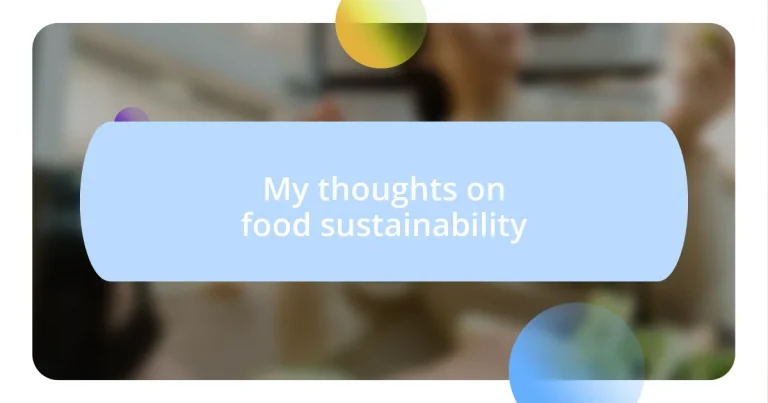Key takeaways:
- Food sustainability emphasizes producing food that is environmentally responsible, socially equitable, and economically viable, requiring mindful choices about food sources and practices.
- Local food systems support local economies, reduce carbon footprints, and typically offer higher nutritional value while fostering a sense of community and connection to food producers.
- Community initiatives, such as food cooperatives and urban gardening, play a crucial role in promoting sustainable practices and reducing food waste, encouraging collective action towards healthier food systems.
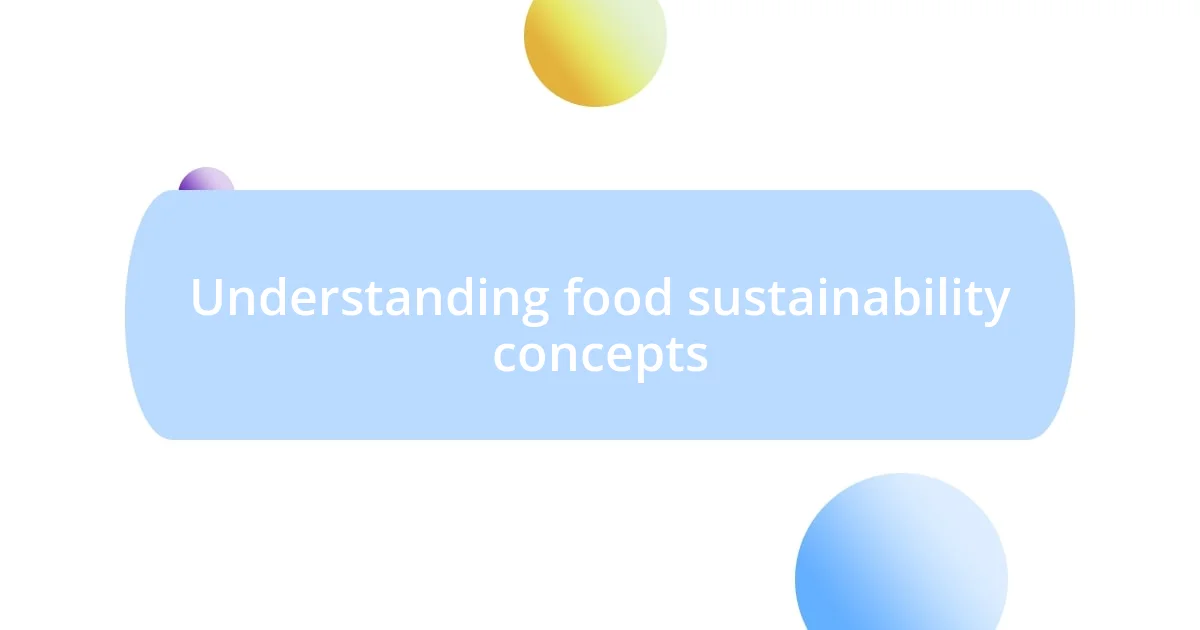
Understanding food sustainability concepts
Food sustainability revolves around the idea of producing food in ways that are environmentally responsible, socially equitable, and economically viable. I remember visiting a local farm that practiced permaculture, a technique that mimics natural ecosystems. It was fascinating to see how they cultivated crops in harmony with the land, fostering biodiversity while producing food. Have you ever thought about how your food choices impact the planet?
Another essential concept in food sustainability is reducing food waste. I can’t tell you how eye-opening it was when I learned that nearly one-third of all food produced globally goes to waste. I started composting leftover scraps, and it made me feel more connected to the food I eat. It’s a small change, but it encourages a mindful approach to meal planning. What steps have you taken to minimize waste in your kitchen?
Understanding food labels is also crucial. Terms like “organic,” “grass-fed,” and “local” often come with specific meanings that can influence your purchasing decisions. I felt a sense of empowerment when I researched these concepts, realizing that my choices could support sustainable practices. It begs the question: How informed are we about what we’re putting on our plates?
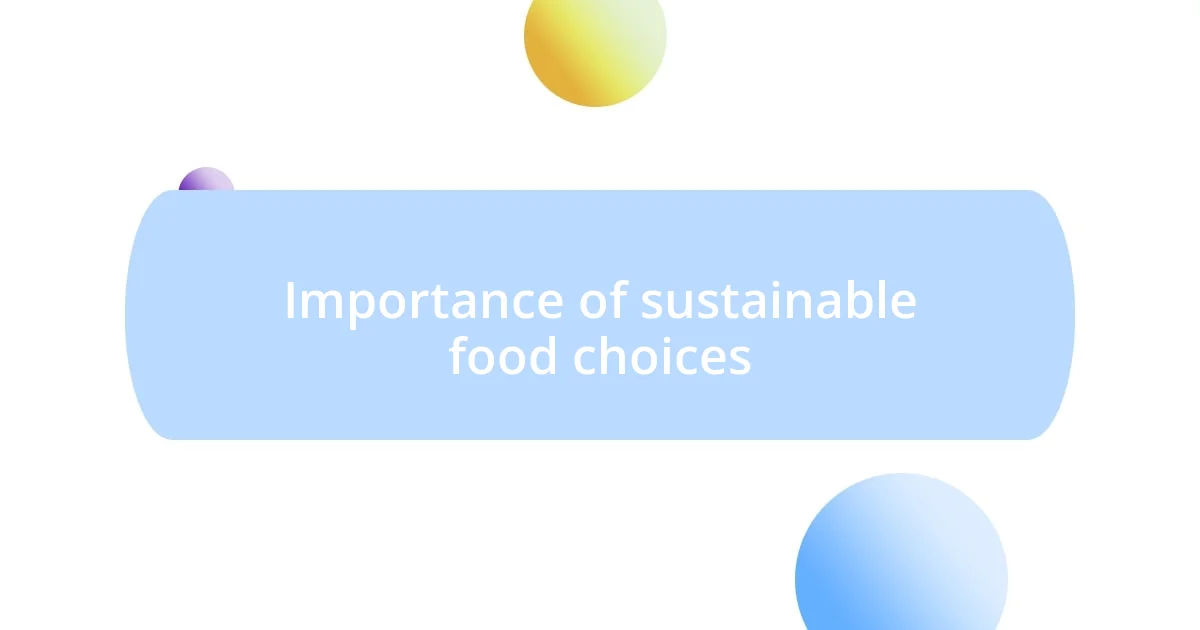
Importance of sustainable food choices
The importance of sustainable food choices cannot be overstated. Each time we select what to eat, we vote for a system that can either preserve or deplete our planet’s resources. I remember the moment I shifted my perspective while shopping at a farmers’ market. I felt a real connection to the farmers who grew my food and realized that my choices could support local economies and reduce my carbon footprint. It sparked a passion in me to consider not just what I eat, but where it comes from.
- Sustainable food choices promote biodiversity by supporting local farms that raise a variety of crops and animals.
- They also reduce greenhouse gas emissions, helping combat climate change for a healthier planet.
- Investing in sustainable practices can lead to better nutrition, as fresh, local produce often contains more nutrients than its processed counterparts.
- Moreover, opting for sustainably sourced foods often supports fair labor practices, ensuring workers receive fair wages and working conditions.
- Lastly, sustainable choices can foster community connections, creating stronger relationships with those who produce our food.
As I delved deeper into sustainable practices, I began to notice how every decision, no matter how small, contributes to a larger impact. I recall going to a local cooperative and learning about how the food I buy can empower farmers and provide them fair trade opportunities. It created a profound sense of responsibility within me; my choices could help nurture the planet while promoting social equity. Have you thought about the ripple effect of your food decisions?
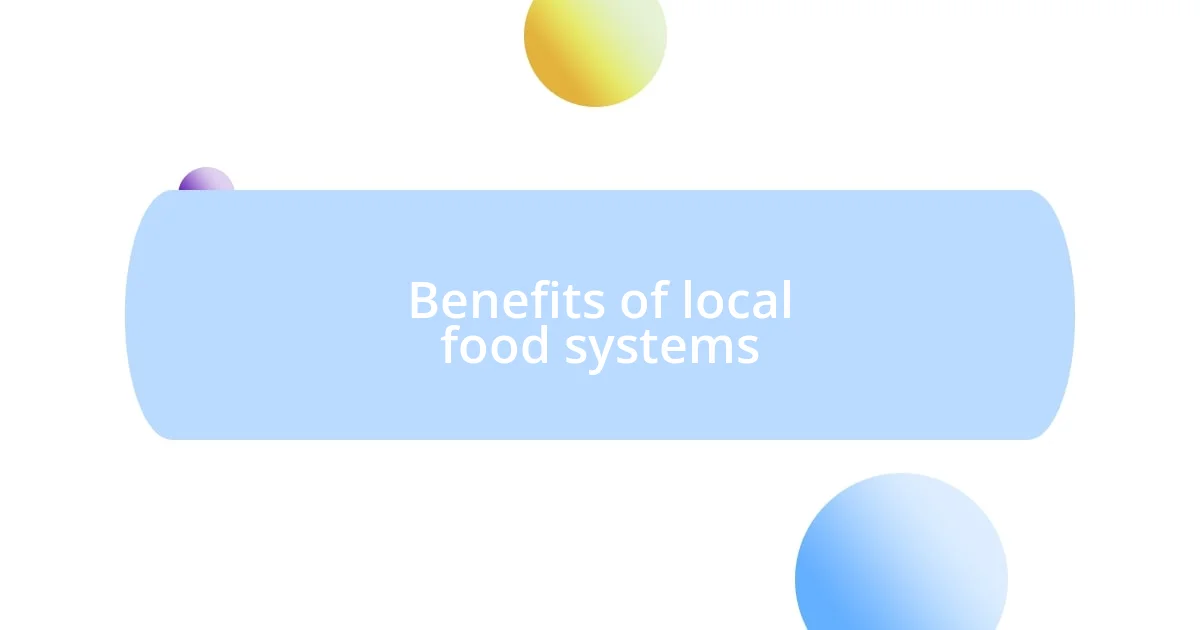
Benefits of local food systems
Local food systems offer a plethora of benefits that can transform our eating habits and communities. One of the most striking advantages is the support of local economies. During a visit to a nearby farm, I was inspired by how they directly engaged with the community. Buying my vegetables from that farm not only meant fresher produce but also meant my dollars were circulating within my community, helping to sustain local jobs and strengthen our local economy.
Moreover, local food systems significantly reduce transportation emissions. When I stopped to think about how far my food traveled from global suppliers, I was shocked. Choosing to buy locally means that I’m consuming food that hasn’t been shipped thousands of miles, which aligns with my commitment to minimizing my carbon footprint. In my experience, I always feel a deeper appreciation for food knowing it has less impact on the environment.
Finally, locally sourced foods often come with a higher nutritional value. I recall a time when I tried fresh tomatoes from a local market versus those from a major retailer. The taste difference was undeniable! And not only that, local produce tends to be picked at peak ripeness, meaning it often contains more nutrients. This makes my meals not just tastier, but healthier too.
| Benefit | Description |
|---|---|
| Economic Support | Boosts local economies by keeping money within the community and sustaining local jobs. |
| Environmental Impact | Reduces transportation emissions, thus lowering the carbon footprint associated with food delivery. |
| Nutritional Value | Provides higher nutrient levels due to fresh, local sourcing and peak ripeness. |
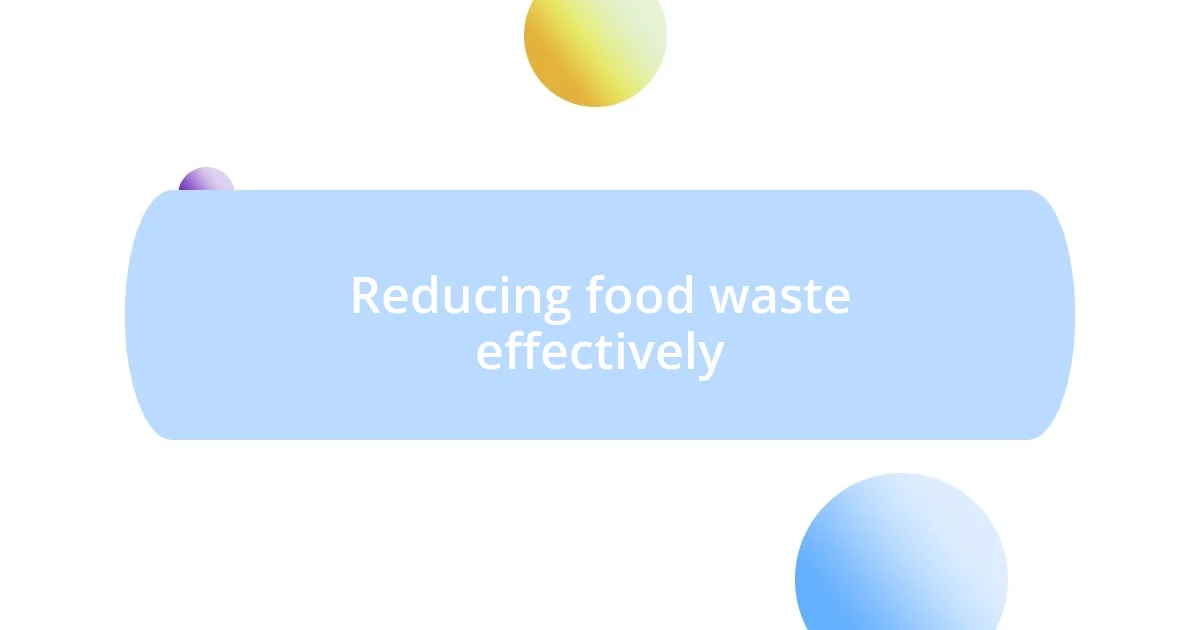
Reducing food waste effectively
Reducing food waste is a challenge that many of us face in our daily lives. I’ve had my share of moments when I found myself tossing out expired items from the fridge, and it really made me question my purchasing habits. Have you ever taken a look at your pantry and realized how much perfectly good food ended up in the trash simply because you forgot it was there? One effective strategy I’ve adopted is planning meals in advance. When I jot down a weekly menu, it not only helps me use what I already have but also ensures I buy only what I truly need.
Another practical approach is embracing the art of leftovers. I recall a time when I had a surplus of roasted vegetables that I thought would go neglected. Instead of letting them wilt away, I transformed them into a delicious soup, a comforting meal that warmed my heart while saving food. This simple act left me with a sense of accomplishment. Have you considered how you can creatively repurpose leftovers instead of discarding them?
Lastly, composting has become a transformative habit for me. I initially saw it as an extra chore, but once I learned about how organic waste can enrich soil, my perspective shifted. It feels like giving back to nature instead of contributing to landfills. Just think about the difference we could make if each of us found a way to reduce, repurpose, and recycle our food scraps!
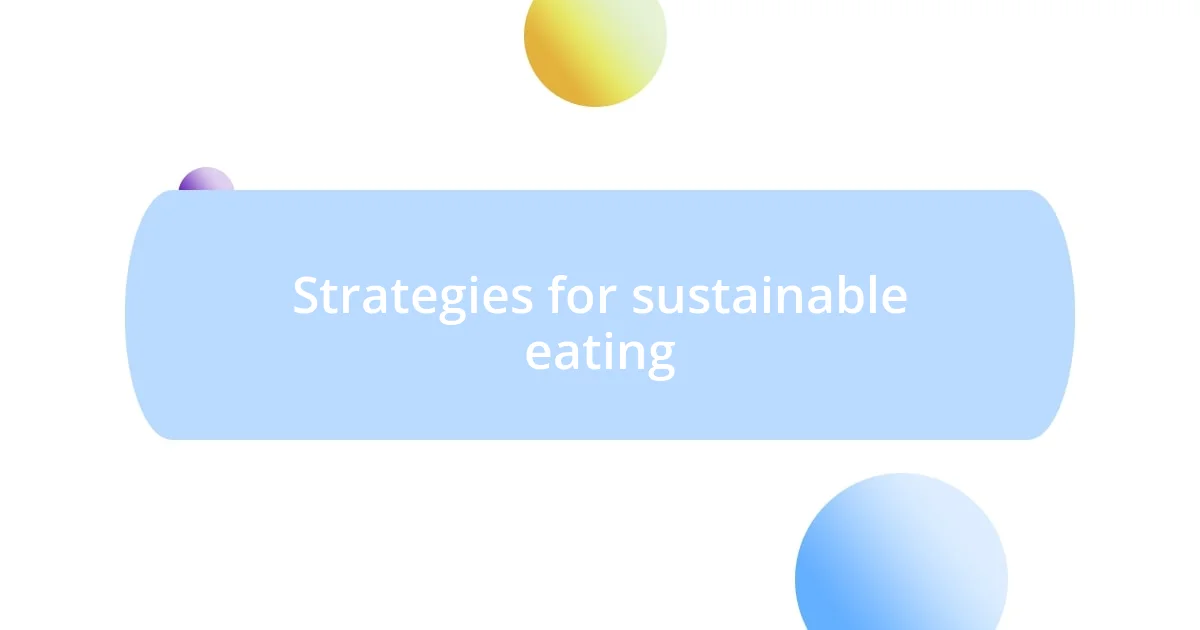
Strategies for sustainable eating
Adopting a plant-based diet is one of the most effective strategies for sustainable eating. When I shifted towards more vegetarian meals, I was surprised to find not just a lighter environmental footprint, but also newfound energy. Have you ever noticed how vibrant fresh veggies can make you feel? By prioritizing plants over meat, I discovered a whole new world of flavors and textures that excite my taste buds while contributing to reduced greenhouse gas emissions associated with livestock farming.
Shopping in bulk has become a game-changer for me, too. On my last trip to the bulk section, I was able to fill reusable bags with grains, nuts, and spices, all without excess packaging. It felt so satisfying! Plus, I often save money while reducing my plastic waste. Have you ever thought about how much packaging contributes to our landfills? I challenge you to consider making bulk shopping a regular part of your routine—it can be a fun exploration of new ingredients!
Lastly, I’ve explored the idea of seasonality in my food choices. Choosing to eat fruits and vegetables that are in season not only makes meals tastier but also supports sustainable farming practices. I remember the first time I tried strawberries in spring rather than frozen ones in winter; the flavor was a revelation! It leads me to wonder: are we truly honoring the rhythms of nature when we ignore what grows in our own backyards? Embracing seasonal eating has made my meals feel more connected to the earth, and I aim to inspire others to experience that too.
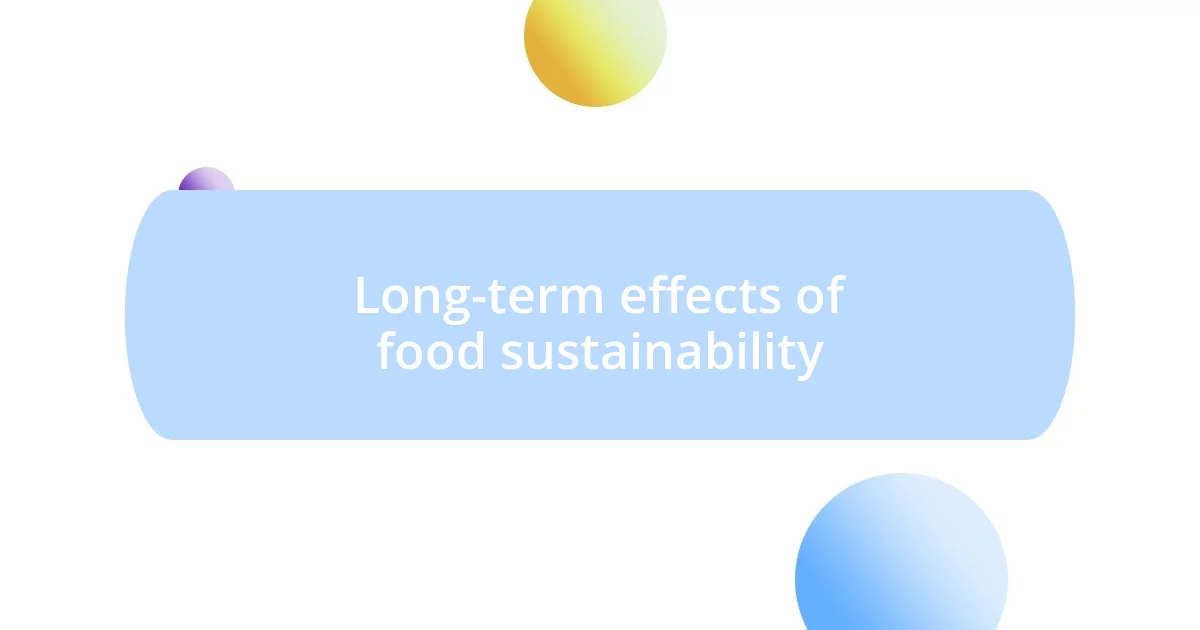
Long-term effects of food sustainability
The long-term effects of embracing food sustainability are profound, reaching beyond the individual plate. I remember a community garden project I joined a few years back. Watching neighbors work together, I felt a powerful sense of connection. It was a reminder that when we commit to sustainable practices, we cultivate not just food, but also relationships that strengthen our communities over time.
Thinking about biodiversity, I’ve noticed that supporting local farmers and diversifying our diets can lead to healthier ecosystems. I participated in a local CSA (Community Supported Agriculture) program, and it was enlightening to taste the variety of produce available based on the season. Have you ever wondered how our food choices impact the variety of species around us? By consciously choosing to buy locally and seasonally, we can contribute to a vibrant food network that nurtures both environment and economy in the long run.
Lastly, the ripple effects of sustainable food choices extend to future generations. I sometimes ponder what world my children will inherit. I want them to experience the joys of fresh, local food, just as I do. By advocating for sustainable practices today, we not only preserve resources but also foster an environment where our kids can build healthy relationships with food and nature. It’s all about creating a legacy—what kind of impact do you want to leave behind?
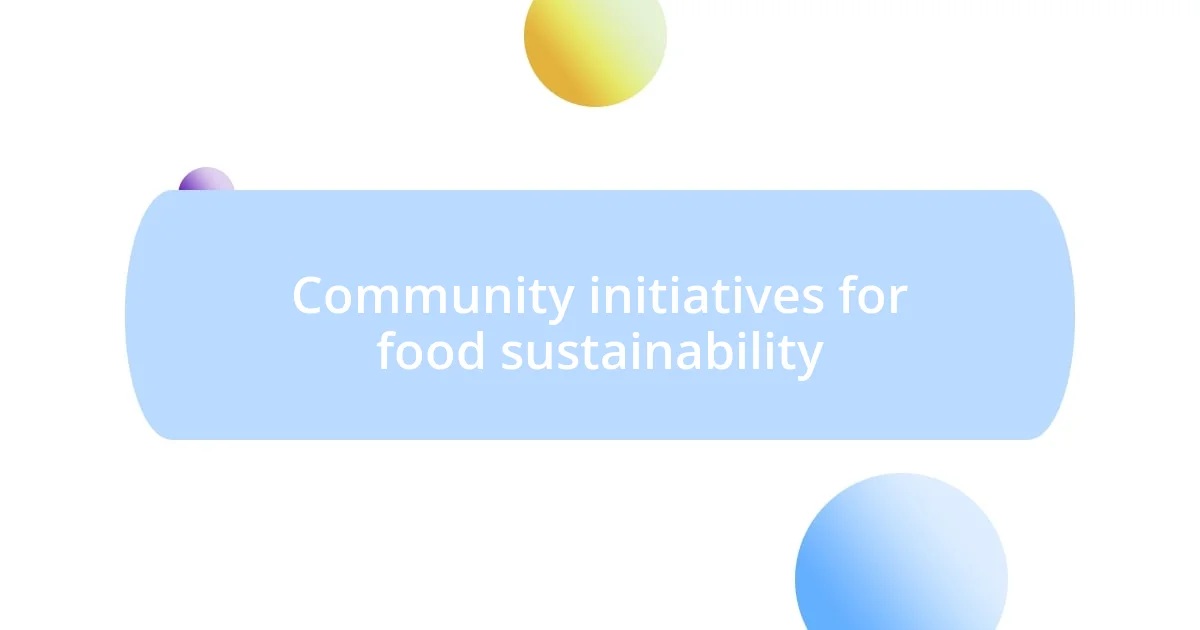
Community initiatives for food sustainability
Community initiatives play a vital role in driving food sustainability forward. I’ve been fortunate to witness firsthand the impact of local food cooperatives. When I joined one in my area, it was invigorating to see how neighbors, motivated by shared values, collaborated to promote healthy eating and support local farmers. Have you ever felt that sense of camaraderie over something as simple yet essential as food? It’s truly uplifting.
Another memorable experience for me was volunteering at a food waste recovery program. I was amazed to see perfectly good produce being saved from landfills, all while providing meals for those in need. It made me reflect on the sheer volume of food that goes to waste daily; how can we not feel compelled to act? Community efforts like this not only reduce waste but also foster a spirit of generosity that’s hard to find elsewhere.
Then there’s the growing trend of urban gardening initiatives. I remember when my neighborhood transformed an empty lot into a thriving vegetable garden. The joy of planting seeds with friends and harvesting fresh tomatoes was unforgettable. It left me wondering: how can something as small as a plot of land create such a big impact? These gardens serve as reminders that sustainable practices are not just necessary; they can also be joyful, uniting us in our shared mission to nurture the planet.












